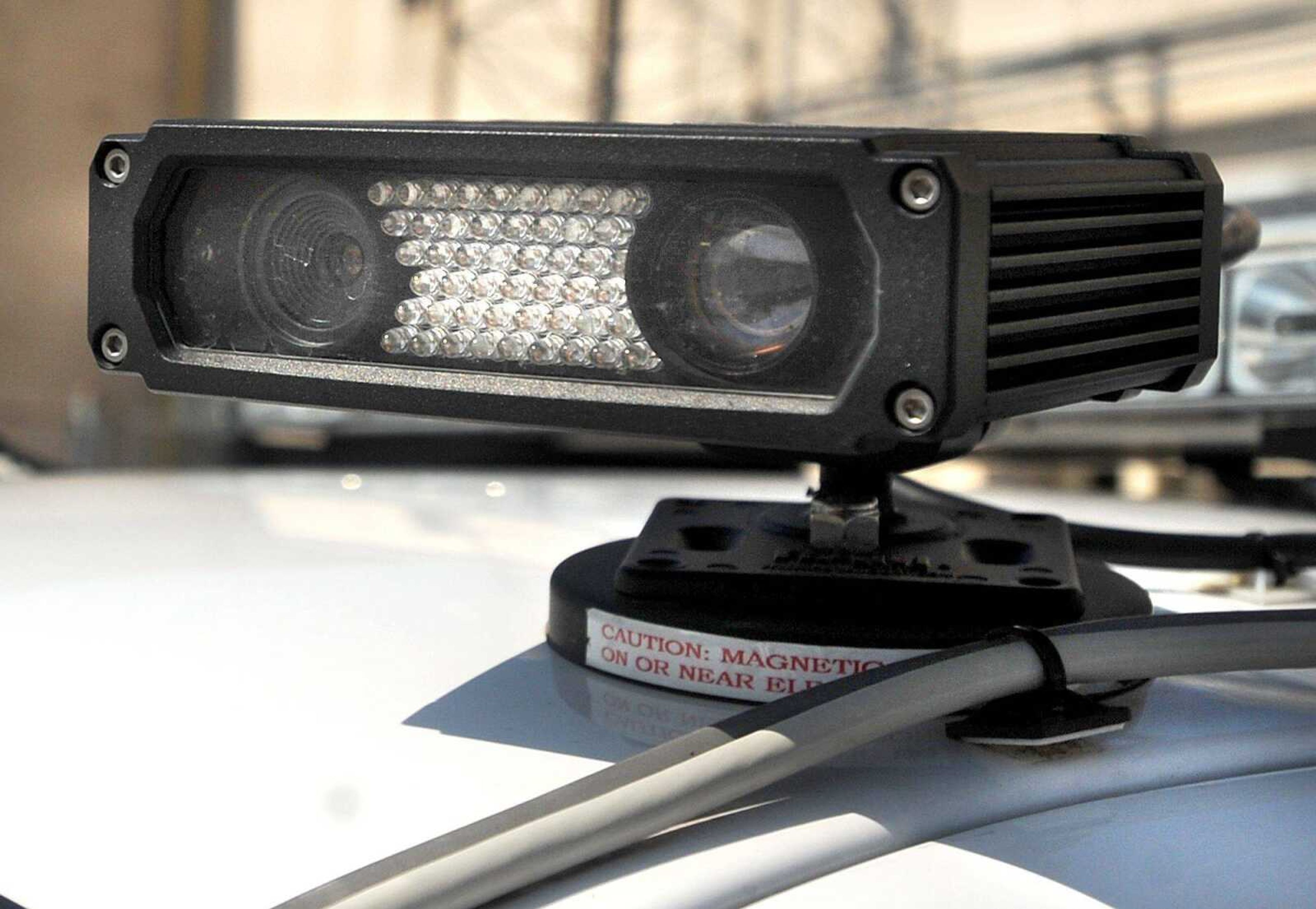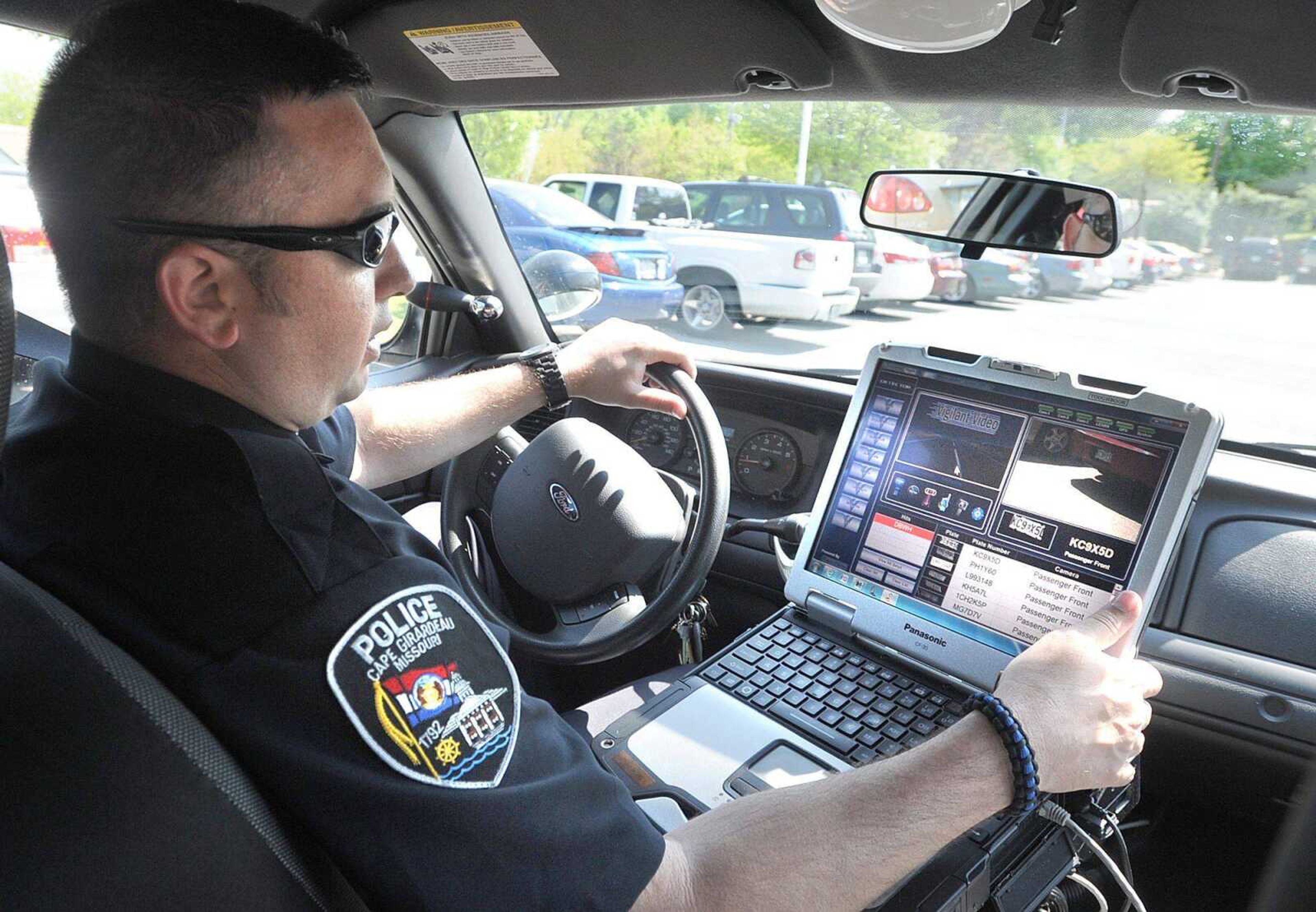A specially equipped patrol cruiser on the streets of Cape Girardeau has the city's police department taking a step forward in using technology to solve crimes. But in some places where it's been used, the new gadget has led to concerns about degrading civil liberties.
For the last seven months, a police car with a group of high-speed cameras attached to its roof captures photographs of nearly every vehicle and its license plate along a traveled route. The photographs appear in an instant on a laptop computer inside the car. Each vehicle's license plate number is sent into a national database that only law enforcement can access, along with the time and location the plate was recorded. The computer system sounds an alarm within seconds if the plate is tagged in the database as belonging to someone with an active warrant or felony criminal history, if the car or plates are suspected stolen or if the plate number is part of an active investigation or Amber Alert. In the last month, the department has scanned more than 27,000 license plates using its automatic plate number recognition technology system.
"Investigatively, it can help us in a way like no other," said patrolman Darin Hickey, the department's public information officer.
Cape Girardeau police have used the system in more than 15 cases that led to arrests. The system also has been used as an aide to identify potential suspects and witnesses in the investigation of a Dec. 16 deadly shooting at The Spot nightclub on South Sprigg Street.
Interim police chief Roger Fields told the Cape Girardeau City Council on Friday during a retreat that a goal for the department is to have the patrol car in use on the street all the time, and when the technology can be used to assist other departments, all the better.

As an example, the system was used in October when a 5-year-old girl was abducted in Poplar Bluff, Mo. Police had a potential suspect and his license plate number, but no idea of his location. He was believed to be on the move. The cruiser with the system was placed on Interstate 55 in hopes the suspect's vehicle would be picked up if it passed.
Reports of thefts from local businesses and gas from convenience stories also have been compiled with the system, according to Hickey, and suspects have been identified and arrested.
A grant from the Missouri Police Chiefs Association bought the equipment last year and sent it into the hands of law enforcement in cities such as Cape Girardeau, Springfield, St. Charles and Joplin.
Use of the technology has grown exponentially in recent years, drawing some criticism of privacy invasion. By some recent estimates, thousands of police departments across the country are using the technology in some form. Many, as in Cape Girardeau, have cameras on one or more patrol cars. Others have stationary cameras installed in high-traffic areas.
The American Civil Liberties Union has been a vocal opponent of the technology. In 2012, the ACLU sent more than 500 public records requests to agencies ranging in size from local police departments to the Department of Justice asking how the technology was being used and what was being done with the recorded data. When some of the requests went unfilled, the organization sued, alleging the technology was allowing police to unjustly track people who did not commit crimes.
Hickey called the system "not 100 percent foolproof."
"It does require the officer to do checkups after the fact," he said.
He pointed out the system does not detect from what state a plate is issued, and said it also does not alert officers to plates attached to drivers with revoked or suspended licenses or drivers who might have other outstanding misdemeanors.
Hickey said he knows about the resistance police have encountered using the system in other Missouri cities.
"People near St. Louis thought it was tracking individuals who didn't commit crimes and giving police instantaneous access to everyone's driver's license information," he said. "They felt it was too much access. But [other departments] weren't doing that, and we are not using it for that. It's strictly an investigative tool."
Councilman John Voss watched Hickey demonstrate the technology during the council's annual retreat.
"I think it's a great investment in technology for our law enforcement officers," Voss said Thursday. "It will help us track down leads on major cases."
Voss mostly rejected the idea that the use of the system is an invasion of privacy.
"Law-abiding citizens shouldn't have anything to worry about," he said. "It will be their friend in a time of need."
The police department doesn't have the manpower to track information for every scan of a plate, Voss said, which should allay some privacy concerns. Still, he said, honest use of the system should be taken seriously.
"Unless there is a justified reason, we shouldn't be looking at what John Q. Public has been up to," Voss said. "But it's information that I think law enforcement has proven is invaluable to solving crimes when they have it at their disposal."
Some police departments have policies allowing them to retain data for only a certain amount of time. Cape Girardeau does not, but Hickey said the computer being used falls under city and department computer policy, which is very detailed in how it can be used and for what purpose. Officers cannot manipulate any information they download from the system for use in an investigation or to turn in for court evidence.
The database in which all of the scanned information is sent and set up for use by other law enforcement agencies is in Virginia. The length of time the data is stored is indefinite. Other parties, such as private investigators, towing companies and bail bondsmen, can enter data if they have purchased their own license plate scanning equipment, but they can't access the data for their own use -- only law enforcement can, Hickey said. The benefit is if police eventually arrest someone the party has been trying to locate.
The department also is learning to use other technologies.
A facial-recognition system being tested recently was granted by the Missouri Sheriff's Association. With the technology, Cape Girardeau police use software to compare booking photos with photos of possible suspects from surveillance cameras, Hickey said. Another system, Leads Online, requires operators of stores and services that deal in secondhand sales to enter descriptions of items they buy and to share that information with police.
"Detectives have had pretty good luck recovering stolen items with it," Hickey said.
An e-ticketing system is slated to roll out in the department before the end of this year. With that technology, patrol officers will be able to scan driver's licenses with a device when they stop vehicles and issue a paper ticket in seconds. The device will contain a list of municipal ordinances. Officers will select the ordinance violated to be printed on the ticket and give the ticket to the offender while information is sent electronically to the municipal court. The system will be paid for with money from the city's Innovation Fund, which receives a portion of revenue the city takes in from the Isle Casino Cape Girardeau.
eragan@semissourian.com
388-3627
Pertinent address:
40 S. Sprigg St., Cape Girardeau, Mo.
401 Independence St., Cape Girardeau, Mo.
Functions of automatic plate number recognition system
* Photographs all license plates within the capabilities of camera's reach
* Enters the photographs into a database with a timestamp and location information
* Alerts officers immediately to plates tagged in investigations, Amber Alerts, or as belonging to a convicted felon or someone with an active warrant
* Law enforcement can map plates that have been picked up by the system
* Information gathered through a database search can be used in investigations and as court evidence
* Law enforcement agencies with systems in use have exclusive access to database
Connect with the Southeast Missourian Newsroom:
For corrections to this story or other insights for the editor, click here. To submit a letter to the editor, click here. To learn about the Southeast Missourian’s AI Policy, click here.







